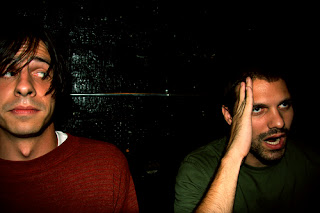Note: I'm now blogging at Blownhorizonz.com. It's more attractive, and it focuses more on cool stuff like music and fiction. Check it out!
It's coming, it's coming, it's here. Collecting over a decade worth of writing about mind-boggling sound, Blown Horizonz strips away the insignificant fuzz and takes you to the deep dark places where music can remake you, remake us, remake our whole society into something bigger, weirder, and more free.
I feel like out of all of the press I've received for this record, that your review is the first one to truly understand where I was coming from and what I was trying to accomplish.
-Dylan Ettinger
Enclosed please find a check representing the payment for your piece selected for Best Music Writing 2010. On behalf of Daphne Carr and all of us at Da Capo, I want to express our deep regret that necessity unfortunately required that your piece be cut from the collection.
-Jonathan Crowe, Editor, Da Capo Press.
Noise is the imperfection that shows us that the world doesn’t have to be the way anyone tells us. Because what is perfect is dead - If some bit of studio-processed pop manages to have a spark of actual artistic life, it is a fluke, a monstrosity, an inexplicable anomaly. The sunzabitches even managed eventually to get the vibrational frequency of ‘grunge’ into a studio processing unit and started making songs in which the distortion sounded careful and clean. It always happens, capitalism recouping some pretty and successful version of a chaotic failure that initially captured attention by being spectacularly WRONG and exciting everyone thereby.
I have witnessed on record and in life an ethical noise, an aesthetic refusal of what we are told to call ourselves, new tribes traveling nomadic routes that short-circuit convention. They were able to do what they wanted and face uncertainty and not panic, which to me seemed as magical and unlikely as Clint Eastwood gunslingers facing down imminent murder without blinking. As much as I’d looked for the darkness, I still carried with me and maybe always will a certain suburban-normal fear of instability, and I looked at the way they lived and I envied it but didn’t feel it was mine to have. I imagined into them some sort of purer unmediated relationship with experience and desire. I wanted that noise to enter the substance of my life, but I could not let go of what was clean and safe.
When something appears simple and clear we are easily deceived into thinking we understand it, and as soon as we are thus deceived we might as well be dead. Confidence and clarity are the end of change and possibility. Noise presents us with an impenetrable barrier and tells us only that we must confront that blank wall and make sense of it ourselves. What we find when we truly face the irrational is inevitably some version of ourselves and what we believe and what we want, truer than what we ever could have seen if we’d been staring at a crystalline Technicolor projection of another person’s dream.
Noise is the sound of not knowing the future, of not needing or wanting anything. Noise takes us to Interzone, to interrogate the black meat, to ask questions about just what is this world we live in, and how can we or should we change it. It forces us to think about change because it shows us that anything Anything ANYTHING is possible. When we confront the blank barrier of the unknowable, the absence of order and meaning, we can admit that we know nothing.
Blown Horizonz is available FREE in a variety of formats from Smashwords for the next week (9/13-9/20).

